The Duchess of Malfi Review 2003
Phyllida Lloyd is an incredible director of enormous talent and great diversity. To be able to direct the delightfully funny and light comic musical Mamma Mia and then turn her hand to Webster's dark revenge drama of barbarity and madness is a witness to her diversity. Her monumental (2 Hours 15 minutes without an interval) production of "The Duchess of Malfi" attests to her talent.
I have never been a great fan of Webster's Revenge Tragedy "The Duchess of Malfi" and have sat through previous productions as a form of theatrical asceticism in the mistaken belief that one had to endure such gruelling experiences in order to pay due respects to theatrical tastes. Similar to enduring your partner's obsession with a hobby one hates, it seems selfish not to participate when the person brings so much pleasure into one's life in so many other ways.
However, my view of the "Duchess of Malfi" was transformed last night, I was transfixed almost from the very beginning of this production. Lloyd places the action in modern dress and uses video technology to great effect. When the Duchess is tormented by the maddening wails of the local asylum inmates we do not have the bazaar spectacle of watching actors twist and gyrate their limbs like some mass contortionist act and listen to them attempt to screech like banshees. Instead the Duchess is drugged, tied to a chair and made to watch a movie of obscene images of mutilated bodies, including those of her husband and eldest son, whilst the asylum inmates sit and watch the movie in dumbstruck convulsions.
Also the many verses included within the dialogue of this script are, on a whole, spoken throughout this production without any great emphasis on prosody and so creates a greater sense of interaction between the characters. This may not be the most aesthetic way of presenting the text, but it certainly helps to bring the story and characters to life.
The simple stage design adds to the drama of the production. The glass panel that is used to represent a wall which follows the action as it takes place on stage, allows one to witness the characters as they spy and act duplicitously. A constant reminder of how suffocating is the small narrow world that the Duchess inhabits. There are a set of steps that fills the back of the stage on which members of the cast sit and witness the action as it occurs, and upon which they take their final resting place after being slaughtered. They act like a great cloud of witnesses testifying to the previous horrors that have occurred and adding their silent voice of condemnation to the murderous acts still to come.
Will Keen plays the part of Ferdinand as if he were the head of a mob of gangsters rather than a powerful Duke. His uncouth and hackneyed touch brings to the fore his deprived nature. Because Ferdinand is so low browed the social contrast between the Duchess and Antonio (her household steward whom she secretly marries) vanishes from the picture and so one is left with only incestuous jealousy as the reason for Ferdinand's rage at news of his sister's marriage. From the moment he appears on stage he constantly fidgets and looks ill at ease as if struggling to contain the insanity that is about to devour him.
Janet McTeer gives a heart wrenching performance as the Duchess. We first see her as a warm vibrant woman who plays with her children and lies contentedly in her husband's arms. The delight she portrays in these relationships makes her torture and murder all the more terrible. And throughout the vicious acts of cruelty she is forced to endure she brings to her character nobility and courage, yet she never appears detached from her agony.
Charles Edwards is disappointing as Antonio. He has the handsome looks of a man who could turn the Duchess's head but none of the audacious charm that would make you believe that he, a mere household steward, could win his lady's heart. The Cardinal (played by Ray Stevenson) is disappointing as he neither delights in his vices nor struggles with his remorse.
Lorcan Cranitch was the biggest disappointment as Bosola, the spy who betrays the Duchess to her brother and who tortures and then murders her. One should surely feel some abhorrence for a man who is willing to murder a mother and her young children in the hope of some social and financial reward and not indifference?
(Alan Bird)
Notices from the popular press....
NICHOLAS DE JONGH for THE EVENING STANDARD says, "Thrills but no chills" MICHAEL BILLINGTON for THE GUARDIAN says, " A mixed affair." BENEDICT NIGHTINGALE for THE TIMES says, " Have seen more menacing Ferdinands than Keen but few who were more unquiet." ALASTAIR MACAULAY for THE FINANCIAL TIMES says, "Either Lloyd has cut some of the play's greatest lines, or they pass for nothing." CHARLES SPENCER for THE DAILY TELEGRAPH says, "The verse speaking is abysmal.......this normally gripping play proves a punishing, deeply irritating endurance test." PAUL TAYLOR for THE INDEPENDENT says, "McTeer's Duchess, poised, elegant, full of warmth, humour and humanity, is utterly convincing."
External links to full reviews from newspapers
Originally published on
